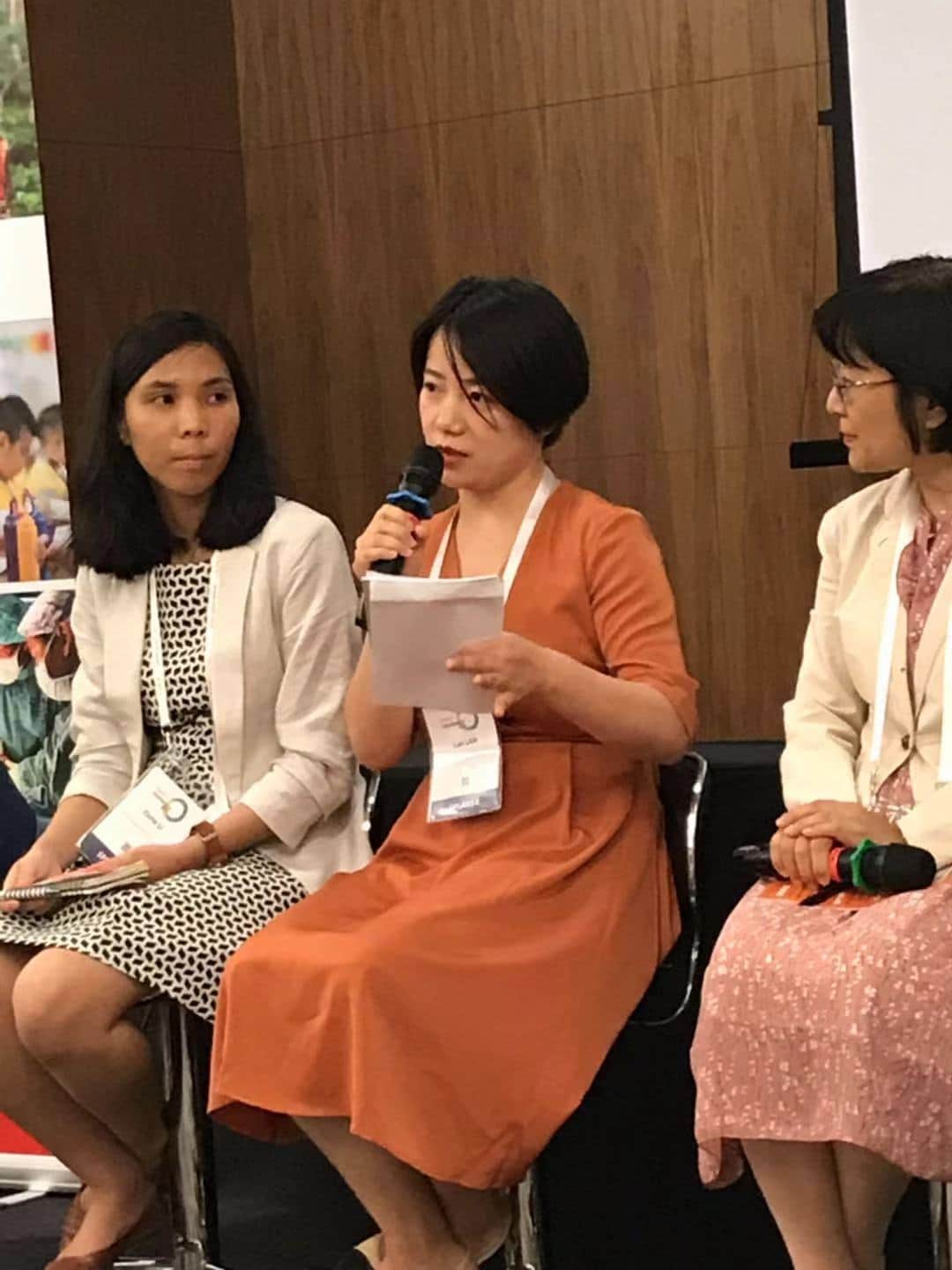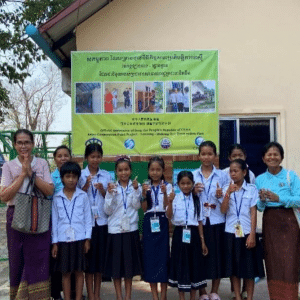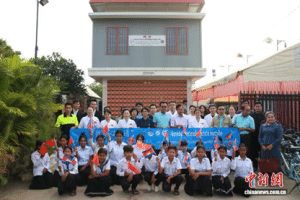Editor’s Note
Lan Lan (兰岚) is the Senior Manager for Corporate Responsibility in PricewaterhouseCoopers (PwC) China, where she has worked since 2010. Before joining PwC, Lan Lan worked in various governmental and UN organizations. She holds two master’s degrees from the universities of Aveiro and Oslo. The following interview was carried out by CDB’s Gabriel Corsetti on the sidelines of AVPN’s annual conference in Singapore, on the 26th of June 2019.

Hello Lan Lan. Could you tell us a bit about PwC’s CSR engagement in China?
There are four parts to it, responsible business, diversity and inclusion, community engagement, and environmental stewardship. Our Corporate Responsibility (CR) team runs the latter two.
When it comes to China, our 2020 community engagement goals are to build a stronger NGO sector, to engage 50% of our staff in volunteering, and to be realised as a leader due to the social value delivered through our services. In terms of environmental stewardship, our main goals are to reduce our carbon emission per capital by 30% from the FY11 baseline, and also to implement real estate sustainability guidelines across our operations in Mainland China and Hong Kong. When it comes to our global goals we now have a new community target, which is that we want to impact 15 million beneficiaries globally by 2022. From the point of view of our environmental strategy, one of the goals is to source 100% renewables for our electricity consumption and offset residual energy use by that year.
So these are our current goals, both globally and locally. We run programmes in line with our Mainland China and Hong Kong CR strategy as well as the PwC’s global CR strategy.
If I may ask, how come PwC just calls it CR, without the S in the middle?
Because we do not want to narrow it down only to social responsibility, when there are also environmental and other kinds of responsibility. Especially as a professional service provider, we feel that we have a responsibility of engaging our clients to also be more environmentally and socially responsible. So it is not only about the social aspect.
Could you tell us more about what kind of programs you are carrying out to achieve the goal of building a stronger NGO sector?
In order to do that, I have to speak a bit further about our strategies. When I say we want 50% of our people engaged in community activities and we want to build stronger NGOs, we really want to do this by leveraging our company and our people’s strength and skills. We want to help the NGO sector grow and earn more trust from the public, so we are trying to leverage our own firm’s skills in this respect. We are not only an accounting firm, we have a whole chain of different types of consulting services that we think can be applied to the NGO sector. We have been working very closely with NGOs ever since we set up this department, making donations and encouraging people to take part in volunteering activities, and as we evolved we realized that the best thing is to use our core competence to support this sector, so that NGOs can help more people.
Over the last five or six years we have tried a lot of different approaches. We started with pro bono projects for NGOs, helping them to work with their financial issues and strategies they needed for free, and then four or five years ago we started to provide free trainings in Beijing, Shanghai, Hong Kong and Shenzhen. We did this annually, with a half-day training in every city. That was how much we can offer, considering the size of our CR team. After the trainings we also provided mentoring programs for free, matching up our senior people with the NGOs, so they can spend 3-6 months together to work on the NGO’s organizational challenges. This was a very successful program, because we set a target to train 1,000 NGOs and we completed that target one year ago.
That was how we envisioned the task of helping to build a stronger NGOs sector in Mainland China and Hong Kong, by offering trainings and mentoring programs. Later on we realized that this is not enough, because there are 800,000 NGOs in China alone, and we only helped 1,000. So then we started a website called toumingngo.com (touming means transparency in Chinese), which is a free self-check tool. This tool opens to all Mainland NGOs, allowing them to check how transparent they are in terms of information disclosure. This is a way of upscaling our impact, and besides that we have also been working on an NGO risk control index for over a year, and we are looking to launch it later this year. This is also a free tool, it is like a manual that NGOs can read through and check whether their organization is in compliance with the charity laws and regulations and whether there are any organisational risks, and there are also some very useful tools they can use to improve their risk control.
So as you can see we have moved from manually organizing trainings and matching our people up with NGOs, which can only impact a small number of NGOs, to publishing the ToumingNGO.com website and soon the risk control index to help more NGOs have a bigger impact. For the future we are thinking of offering online courses, leveraging the internet so we can be more impactful and cover more NGOs regardless of their location.
China recently passed two news laws of concern to the NGO sector. One is the Charity Law and the other one is the Overseas NGO Management Law. How have these two laws impacted the work you do with NGOs in China?
Well, we have been paying close attention to these two laws, and what we have been doing is to see whether they have impacted our relationship with the NGOs we are helping. Since in Mainland China we mainly work with Chinese charities, the INGO Law had a limited impact on the organizations we work with. Regarding the new Charity Law I think it is a good development, because it means there is a regulation that will serve as a guidance for NGOs in general, and the toumingngo website is actually also based on the new Charity Law to provide guidance for NGOs on how to be more transparent and trustworthy.
How would you say the concept of CSR, or CR, is understood in China? Is there is a big gap with how it is understood elsewhere, and would you say more people have become aware of the concept since you started working in this field?
When I entered this field nine years ago, if people asked me what I did I would normally just tell them I did charity or PR work, because it would save me having to explain. Nowadays on the other hand I’ll just say I do CSR, and most people outside of the NGO/CSR circle will get it. Speaking of the general public I think people are now more aware of this concept, and if you mention CSR they roughly understand what you mean, although different people still have different understandings. People who are not working in the NGO or CSR sector will sometimes ask me if it is more about charity or more about PR, so this makes me feel that their understanding is still basic, but at least the public have become familiar with the concept.
I think the concept is getting more accepted by society, it’s just that people have different definitions. A lot of people don’t think about how to incorporate company responsibility into their everyday business and operations, so there is a long way to go. There is also still a gap between China and other countries. For instance we have a network of CR practitioners within PwC, and when you look at our peers in more developed countries like America or Australia, I think they are doing much better at really incorporating CR into their business. In our office in the US, the CR department (they call it Responsible Business Leadership) helps clients to build up their CR strategies and work on sustainable issues, on top of the conventional donation and volunteering engagements.
If you talk about how other companies in China view CSR, I think there are gradually more enterprises that have people doing CSR, but still the focus is more on the image and the branding, and some of them want to see immediate returns in terms of how to build up their brand. So here you can see the gap between us and the developed countries, where the companies are already looking more at the actual impact they have. I think we need to be patient in this respect.



